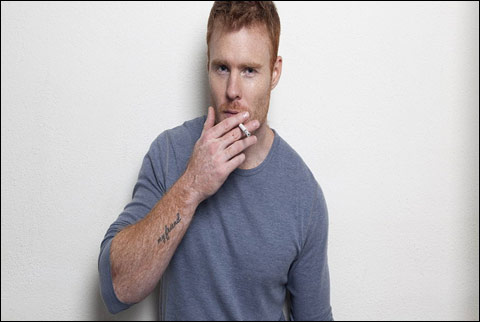 |
Making dance music that's fun is serious business — especially if you make it your life's work, like Andy Butler, main man/svengali behind Hercules and Love Affair. The Denver native has been honing his dance-music-composition chops since he left the Colorado-leather-bar-DJ gig of his teens to make it in the Big Apple. He found success in 2008 with the explosive debut of Hercules, a rotating line-up of singers and musicians doing his bidding as if he were Neil Bogart running Casablanca Records. Herc shot to prominence on the strength of their irresistible update of the large-band sound of classic disco, and the power of lead single "Blind," which featured the diva vocalizing of Butler's old pal Antony Hegarty of Antony & the Johnsons. The band's homonymous debut long-player had Hegarty guesting on four more tunes, with the bulk of the rest of the vocal duties being handled by NYC über-diva Nomi Ruiz. Butler is gearing up to unveil his sophomore outing this September, with guest vocals by Bloc Party's Kele Okereke. I caught up with him via telephone from Denver as he prepared to unveil the new material on a tour that brings the band to Great Scott in Allston on July 29.
We don't know much about the new album, not even the title yet — although your blog describes it with one word: "emotional."
It is! Well, the record — I mean, the last one was equally emotional, you know. Introspection, self-reflection, confusion, sadness, loss, that sort of thing. There's definitely a lot of emotionally charged music on it. A song like "Blind," etc. I guess, though, that the range of emotions on the new record is wider, more dynamic. I dunno, I guess I explored other aspects of my psyche besides just sadness or celebration. There are songs about revenge, about defiance. You know, defiant of people prying into your life, getting people to stay out of your business. I guess I was just dealing with a wider array of emotions: anger, but also intensity, redemption, etc. It's an emotional record.
So would you say that you're dealing, in part, with the changes brought about by the success you found with the first album?
That's definitely part of it, but part of it has to do with the emotional place I was in when I wrote those songs, whilst in the midst of a brutal touring schedule, lots of prying interviews, some uncomfortable moments, all sorts of issues between all sorts of people. So it was definitely formed by the experience of the last few years.
It's interesting, the way you describe your music as so emotional, and at times pained, since it is, broadly defined, dance music, and most people see dance music as just about having fun and being happy-go-lucky. Does dance music mean something else to you, something deeper?
Oh sure. I mean, I have always liked dance music. I remember so well one of my favorite lines from an old classic house track by Murk is "Just like my momma said/If you ever get misled/Forget about your lover/You must always keep your pride/In order to survive/There will always be another/" And just that, in itself, is a very powerful life lesson that is summed up very poetically and simply, on a deep-house track. And even just, sometimes, simple vocal loops that are repetitive, very post-modern. Like, you know, "lift me up lift me up lift me up lift me up." These kinds of things have more significance, at least for me, than just like "I'm at a party and it's just a sound." Dance music has always spoken to me on a legitimately serious emotional level.